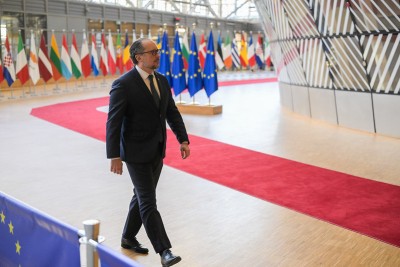Minister Schallenberg at the European Foreign Affairs Council
Austrian Foreign Minister Alexander Schallenberg traveled to Brussels for the European Foreign Affairs Council (FAC) to meet with his counterparts from the other EU-member states. The main focus of the agenda was Iran.
 Minister Schallenberg Attended the EU - FAC Meeting in Brussels. / Picture: © BMEIA Bundesministerium für Europa, Integration und Äußeres / Gruber / Flickr Attribution 2.0 Generic (CC BY 2.0)
Minister Schallenberg Attended the EU - FAC Meeting in Brussels. / Picture: © BMEIA Bundesministerium für Europa, Integration und Äußeres / Gruber / Flickr Attribution 2.0 Generic (CC BY 2.0)
Foreign Minister Alexander Schallenberg traveled to Brussels on December 12 for the FAC meeting, where the main agenda of the day was the condemning of the use of violence by the Iranian government against the demonstrators in the country, as well as condemning the drone deliveries to help Russia in its invasion against Ukraine.
Schallenberg strongly condemned the executions of Iranians arrested in connection with the nationwide protests. He said” The death penalty is a cruel and inhuman punishment that violates human dignity. Austria is therefore resolutely opposed to the death penalty. Unfortunately, we are seeing Iran walking backward, where human rights are being trampled on and people executed on flimsy grounds. The Iranian leadership must be clear that we are not standing idly by. Women's rights are human rights, and they also apply in Iran”
During the Council meeting, the EU foreign ministers unanimously decided on further sanctions against Iran. On the one hand, these target those associated with the violent repression in Iran and, on the other hand, the supply of Iranian combat drones to Russia. According to Foreign Minister Alexander Schallenberg, it is also completely unacceptable for Iran to become the henchman of the Russian aggressor in the war against Ukraine.
With the involvement of Ukrainian Foreign Minister Dmytro Kuleba, the ministers also discussed the EU's relations with Russia. Foreign Minister Alexander Schallenberg pointed out that Russian President Putin uses cold and hunger as weapons. In doing so, he intends to break the resistance of the Ukrainian population, trigger new refugee movements and thus endanger European unity. Austria's priority is therefore all the more on humanitarian aid for the Ukrainian civilian population.
In the end, the Eastern Partnership ministers also shared their views with their counterparts from Armenia, Azerbaijan, Moldova, Georgia and Ukraine at an informal working meeting. Discussions focused on boosting reforms in states in Eastern Europe and the South Caucasus and ensuring security in these regions in the context of Russia's war of aggression.



